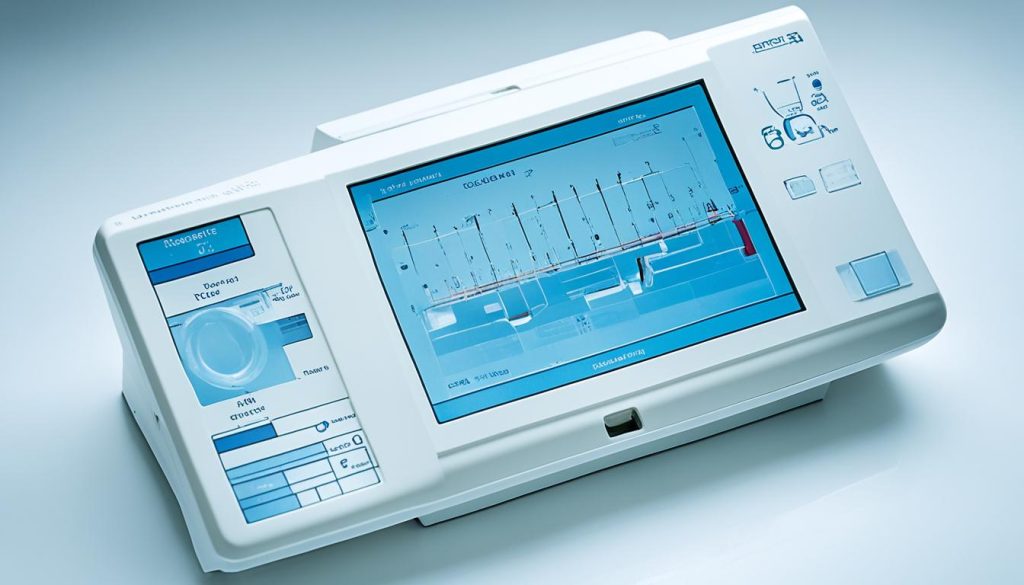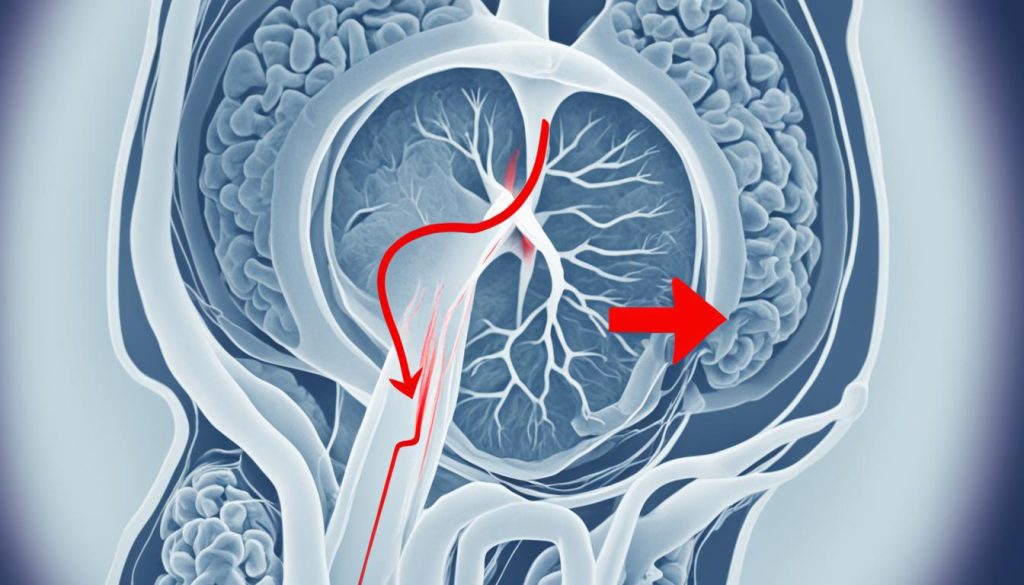An ectopic pregnancy occurs when a fertilized egg implants and grows outside the main cavity of the uterus. The most common type is a tubal pregnancy, where the egg attaches to the fallopian tube. Some early signs and symptoms of an ectopic pregnancy include missed period, breast tenderness, nausea, light vaginal bleeding, and pelvic pain. However, it’s important to note that these symptoms may be similar to those of a normal pregnancy, so seeking a proper diagnosis is crucial.
If you experience severe abdominal or pelvic pain accompanied by vaginal bleeding, extreme lightheadedness or fainting, or shoulder pain, it is important to see a doctor immediately.
How Do You Know if You Have an Ectopic Pregnancy?
Causes and Risk Factors of Ectopic Pregnancy
The exact cause of an ectopic pregnancy is often unknown, but certain risk factors can increase the likelihood of experiencing one. Understanding these risk factors is crucial in recognizing potential indicators and seeking appropriate medical attention.
Risk Factors
Several factors contribute to the risk of developing an ectopic pregnancy:
- A history of previous ectopic pregnancies
- Inflammation or infection in the fallopian tubes
- Fertility treatments like in vitro fertilization (IVF)
- Tubal surgery
- Certain types of birth control, such as IUDs or tubal ligation
- Smoking
- Certain medical conditions like endometriosis
By understanding these risk factors, individuals can be more aware of the potential for an ectopic pregnancy and take appropriate precautions or seek timely medical intervention.

It’s worth noting that these risk factors don’t guarantee the development of an ectopic pregnancy, but they do increase the chances. By addressing these risk factors and seeking early medical attention, individuals can potentially minimize the risk and ensure better reproductive health.
Complications and Prevention of Ectopic Pregnancy
If left untreated, an ectopic pregnancy can lead to life-threatening complications, including rupture of the fallopian tube and severe internal bleeding. Prompt diagnosis and treatment are essential to prevent such complications. Unfortunately, there is no way to prevent an ectopic pregnancy entirely. However, reducing the risk can be achieved through various measures:
1. Limit Sexual Partners and Use Condoms: Limiting sexual partners and practicing safe sex by using condoms can help prevent sexually transmitted infections (STIs), which can cause inflammation in the fallopian tubes.
2. Quit Smoking: If you are planning to conceive, quitting smoking before attempting to get pregnant can reduce the chances of an ectopic pregnancy. Smoking has been associated with an increased risk of fallopian tube inflammation and damage.
3. Consider Birth Control Options: Discuss with your healthcare provider which birth control method is best for you. While there is no foolproof method to prevent ectopic pregnancy, certain types of birth control such as intrauterine devices (IUDs) and tubal ligation may increase the risk. Your healthcare provider can help you choose a method that suits your needs and minimizes the risk.
4. Seek Treatment for Pelvic Infections: Promptly seeking treatment for pelvic infections can help prevent inflammation and scarring in the fallopian tubes, reducing the risk of ectopic pregnancy.
5. Attend Regular Check-ups: Regular check-ups with your healthcare provider can help identify any potential risk factors or concerns early on. Addressing any reproductive health issues promptly can help reduce the chances of developing complications related to ectopic pregnancy.
It is important to take proactive steps to minimize the risk of ectopic pregnancy. While prevention is not always possible, being informed and practicing good reproductive health can significantly reduce the chances of experiencing this potentially dangerous condition.
Understanding Ectopic Pregnancy Complications
Ectopic pregnancy complications can be severe and require immediate medical attention. Failure to treat an ectopic pregnancy promptly can result in the following complications:
| Complication | Description |
|---|---|
| Ruptured Fallopian Tube | Without treatment, the growing embryo can cause the fallopian tube to rupture, leading to severe internal bleeding. |
| Severe Internal Bleeding | An untreated ectopic pregnancy can cause significant internal bleeding, which may be life-threatening if not addressed promptly. |
| Hemorrhagic Shock | Severe bleeding from a ruptured fallopian tube can lead to hemorrhagic shock, a life-threatening condition that occurs when the body cannot supply enough blood and oxygen to vital organs. |
| Infertility | In some cases, the removal of the fallopian tube or damage to the reproductive organs during surgery to treat an ectopic pregnancy can result in infertility. |
Diagnosis of Ectopic Pregnancy
To accurately diagnose an ectopic pregnancy, healthcare providers utilize various tests and examinations. These include:
- Pregnancy Test: A pregnancy test is conducted to confirm pregnancy. A positive result indicates the presence of pregnancy hormones, but further tests are necessary to determine if the pregnancy is ectopic.
- Pelvic Exam: During a pelvic exam, the healthcare provider examines the reproductive organs for any abnormalities. They assess the size, shape, and tenderness of the uterus and ovaries.
- Ultrasound: An ultrasound is a non-invasive imaging test that provides visualization of the uterus and fallopian tubes. This procedure helps identify if the pregnancy is located outside the uterus, aiding in the diagnosis of an ectopic pregnancy.
- Blood Tests: Blood tests measure the levels of human chorionic gonadotropin (hCG), a hormone produced during pregnancy. The analysis of hCG levels over time helps determine the viability of the pregnancy and its location.
The combination of these tests assists healthcare providers in accurately diagnosing ectopic pregnancies and determining the location of the pregnancy, providing crucial information for appropriate management.

Understanding the Importance of Diagnosis
The prompt and accurate diagnosis of an ectopic pregnancy is crucial for preventing life-threatening complications. Identifying an ectopic pregnancy early on allows for timely medical intervention and management.
Treatment options for Ectopic Pregnancy
The treatment of an ectopic pregnancy depends on several factors, such as the location and size of the pregnancy, as well as the overall health of the individual. In some cases, medication, such as methotrexate, may be administered to stop the growth of the pregnancy and allow the body to reabsorb it. However, surgery is often necessary, particularly if the ectopic pregnancy has ruptured or is at a high risk of rupture.
Surgical interventions include laparoscopy, where the ectopic pregnancy is removed through small incisions, or laparotomy, which involves a larger incision. The choice of treatment is made based on the individual’s condition and the recommendations of their healthcare provider.

Ectopic Pregnancy Treatment Options:
Here is a summary of the treatment options for ectopic pregnancy:
| Treatment | Description |
|---|---|
| Medication (Methotrexate) | Administration of medication to stop the growth of the ectopic pregnancy and allow reabsorption by the body. |
| Laparoscopy | Minimally invasive surgical procedure where the ectopic pregnancy is removed through small incisions. |
| Laparotomy | Invasive surgical procedure involving a larger incision to remove the ectopic pregnancy, often used in cases of rupture or high risk of rupture. |
Outlook and Prognosis for Ectopic Pregnancy
The prognosis for an ectopic pregnancy varies depending on the individual’s specific circumstances and the timing of diagnosis and treatment. Early detection and prompt medical intervention play a crucial role in ensuring a positive outcome.
If diagnosed and treated promptly, the prognosis for ectopic pregnancy is generally good, with most individuals making a full recovery. Timely treatment can help prevent further complications and minimize the risk of long-term health issues.
However, if an ectopic pregnancy goes undetected or is not treated in a timely manner, it can lead to severe complications. Rupture of the fallopian tube, resulting in hemorrhagic shock, is one such complication that may arise if the condition is left untreated. In some cases, the damage caused by a ruptured ectopic pregnancy may result in long-term fertility issues, leading to difficulties conceiving in the future.
Regular follow-up care and discussions with healthcare providers are crucial for monitoring recovery and addressing any concerns or complications that may arise. After treatment, it is essential to attend scheduled check-ups and follow the doctor’s advice to ensure proper healing and to address any lingering physical or emotional effects of the ectopic pregnancy.
In summary, the outlook for an ectopic pregnancy largely depends on early diagnosis, timely treatment, and diligent follow-up care. With appropriate medical intervention and support, individuals can achieve a positive prognosis and move forward in their reproductive journey.

Statistical Data on Ectopic Pregnancy Prognosis
| Time of Diagnosis and Treatment | Prognosis |
|---|---|
| Early diagnosis and prompt treatment | High chances of full recovery |
| Delayed diagnosis or treatment | Increased risk of complications and long-term fertility issues |
| Rupture of the ectopic pregnancy | May lead to severe complications and require immediate medical attention |
Conclusion
Early detection and prompt medical intervention are crucial in ensuring a successful outcome for individuals with an ectopic pregnancy. If you experience severe abdominal or pelvic pain accompanied by vaginal bleeding, it is essential to seek immediate medical attention. Understanding the risk factors associated with ectopic pregnancy can help you make informed decisions about your reproductive health and take preventive measures if necessary.
With the right care and treatment, the prognosis for individuals with an ectopic pregnancy is generally positive. However, ongoing follow-up care and support are important for overall well-being. Regular discussions with your healthcare provider and adherence to recommended follow-up appointments will help monitor your recovery and address any concerns or complications that may arise.
By staying informed and proactive, you can play an active role in safeguarding your reproductive health and seeking the necessary care if needed. Remember, early detection and appropriate treatment are key to ensuring the best possible outcome for individuals with an ectopic pregnancy.




